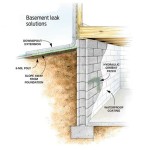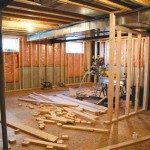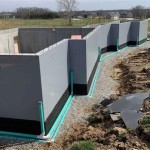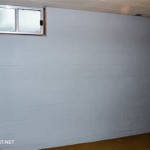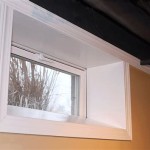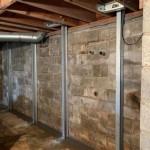How to Seal Leaky Basement Walls: Essential Aspects
Dealing with a leaky basement can be frustrating and inconvenient. Moisture seeping through the walls can cause mold growth, structural damage, and a musty odor. Sealing leaky basement walls is crucial to maintain the integrity of your home and create a healthy living environment. Here are the essential aspects of sealing leaky basement walls:
1. Identify the Source of the Leak:
Before attempting repairs, it's essential to determine the source of the leak. Common causes include cracks in walls, holes in pipes, poor drainage, or foundation issues. Inspect your basement thoroughly, paying attention to areas where water is pooling. Consider using a moisture meter or hiring a professional for a thorough evaluation.
2. Prepare the Wall Surface:
Once the leak source is identified, prepare the wall surface by removing any mold or mildew. Clean the wall with a bleach solution and let it dry completely. Use a wire brush to remove any loose paint, debris, or dirt.
3. Seal Cracks and Holes:
For small cracks and holes, use a hydraulic cement or epoxy-based crack filler. Inject the filler into the crack and smooth it over the surface. For larger cracks, consider using a waterproof sealant tape or a patch kit.
4. Install Waterproofing Membrane:
Applying a waterproofing membrane to the wall surface serves as a protective layer against moisture penetration. Use a trowel-on membrane or a self-adhesive membrane. Ensure that the membrane covers all cracks and holes and extends several inches above the ground level.
5. Improve Drainage:
Addressing poor drainage can prevent water from seeping into the basement. Install downspouts to direct rainwater away from the foundation. Ensure that gutters are clean and free of debris. Consider installing a sump pump to remove excess water from the basement floor.
6. Enhance Insulation:
Insulation helps reduce moisture problems by preventing condensation on the basement walls. Use rigid foam insulation boards or spray foam insulation to create a moisture-resistant barrier.
7. Professional Help:
If the basement leak is extensive or the source is difficult to identify, don't hesitate to seek professional assistance. A licensed waterproofing contractor can assess the situation, determine the underlying cause, and recommend the most effective solution.
Sealing leaky basement walls requires a systematic approach and careful attention to detail. By following these essential aspects and addressing the underlying causes, you can effectively prevent water intrusion, preserve your basement's structural integrity, and create a healthier living space.
How To Fix Basement Wall Cracks American Dry
Repairing Leaking Basement Walls What Works And Doesn T Work For Wall Leak Repairs
Waterproofing Basement Walls Dos And Don Ts To Remember Bob Vila
Waterproofing Basement Walls Dos And Don Ts To Remember Bob Vila
How To Waterproof Basement Walls With Flex Seal Products Youtube
The Best Methods For Basement Leak Repair Acculevel
Repairing Leaking Basement Walls What Works And Doesn T Work For Wall Leak Repairs
How To Waterproof Your Basement True Value
Guide To Waterproofing Basement Walls
How To Waterproof Basement Walls From Inside Sani Tred
See Also

